Study abroad is probably the most well-recognized form of experiential learning for students of world languages. But not all students can afford to study abroad, or they have work or family obligations that prevent them from doing so. And, of course, while we are in a pandemic, international travel is not possible. Both before and during the COVID-19 crisis, World Languages and Literatures professors have regularly offered students opportunities to engage with the languages and cultures they study in a variety of ways both in and outside of the classroom—in the local community and virtually.
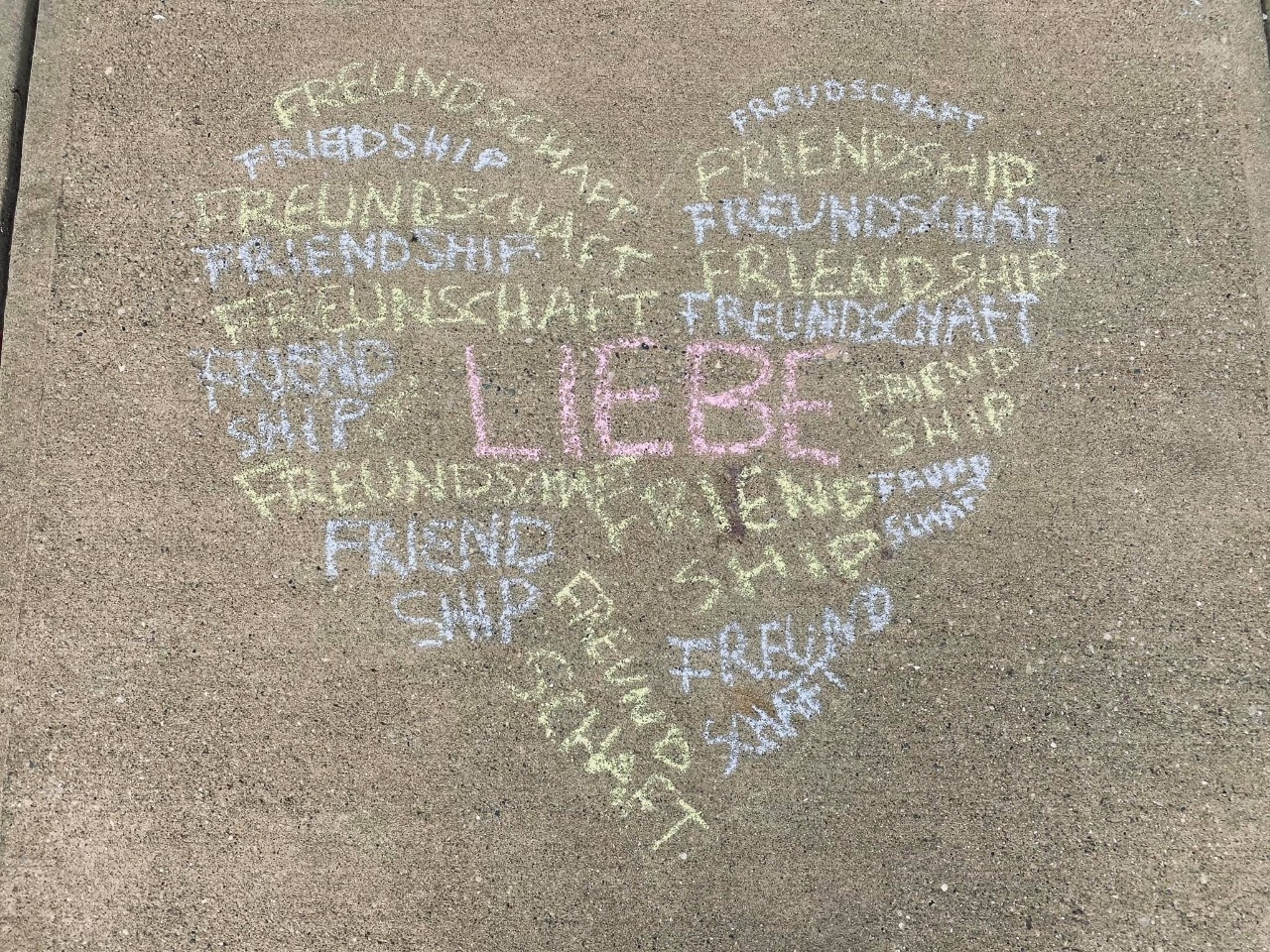
Wunderbar Together: Celebrating the Year of German-American Friendship at NKU
In 2019, German professor Dr. Andrea Fieler successfully applied for a “Campus Weeks” grant from the German Embassy to host events on campus throughout the Fall Semester to celebrate the 30th anniversary of the Fall of the Berlin Wall and the Year of German-American Friendship (dubbed, “Wunderbar Together”). In September, the German Club organized a tour of Cincinnati’s historic Over-the-Rhine neighborhood led by Dr. Don Heinrich Tolzmann, president of the German-American Citizens League and Curator of the German-American Heritage Museum. In November, students from German classes participated in a “Chalking About Friendship” event on NKU’s campus and wrote poems and messages about friendship in English and in German in chalk on the plaza.
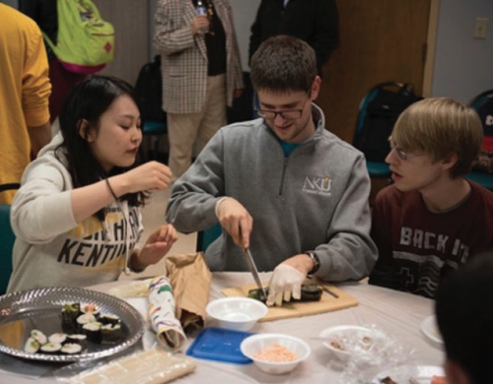
Sushi and dumpling-making party to celebrate our new Japanese major
In September 2019, our new assistant professor of Japanese, Dr. Junko Agnew, worked together with the other Japanese professors, Professor Makoto Nakamura and Professor Akiko Marui, students in our Japanese program, and Communications professor, Dr. Yasue Kuwahara to host a sushi and dumpling-making party in the Baptist Student Union. Students, professors and staff
from across the university came together to prepare and eat lots of delicious Japanese food!

Internships and Volunteer Opportunities for Spanish majors, minors and alums at the Esperanza Latino Center in Covington, Kentucky
Thanks to the hard work and dedication of WLL Spanish professor Irene Encarnación and NKU’s Director of Latino Programs and Services Leo Calderón, the Esperanza Latino Center of Northern Kentucky opened its doors Covington in January 2019. Since opening, the Centro Esperanza has provided numerous internship and volunteer opportunities for current WLL students and alums. Not only are our students learning valuable skills that will serve them after graduation, they are also serving the local Hispanic community in important ways. To learn more about the Esperanza Latino Center, visit: esperanzanky.org

NKU students and faculty engaging with French culture
in the local community
In February 2020, French students and professors attended a performance of Les Misérables at the Aronoff Center in Cincinnati. French students and professors regularly visit exhibits of French art, see performances of French plays and view showings of Francophone films in the Cincinnati area.
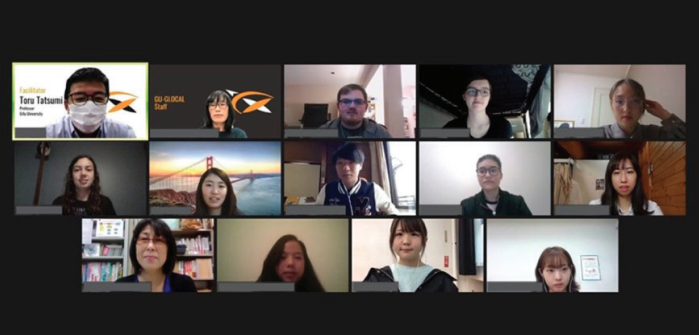
Virtual exchanges with students at Gifu University and Musashi University in Japan
Since study abroad is not possible because of COVID-19, virtual exchange meetings between NKU students and students at Gifu University and Musashi University in Japan were organized in fall 2020 to give students the opportunity to practice their language skills and engage with their Japanese peers at our partner schools in Japan.
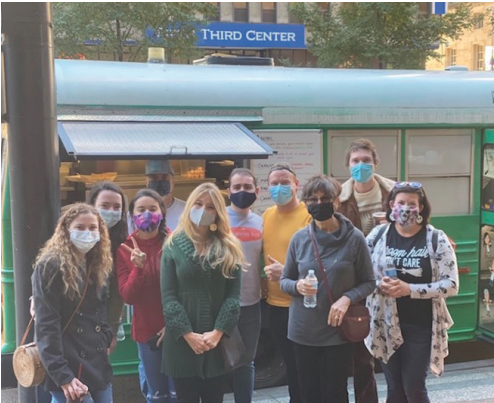
Spanish professor Sandra Bazzani offers her students opportunities to practice Spanish and experience Latin American culture both locally and virtually
Professor Bazzani is very dedicated to providing her students with real-world opportunities to engage with the Spanish language and learn about issues of importance to Latin American societies, like education and health care. The events she organizes are both fun and educational!
In October 2020, she organized an Empanadas Aquí food truck event for her students in downtown Cincinnati. The students got to eat delicious Venezuelan empanadas and use their Spanish to order their food!
Also, during the month of October, Professor Bazzani organized virtual conversations between her SPI 201: Intermediate Spanish students and members of the Fundación Proyecto Maniapure, a non-profit based in Venezuela and the U.S. that works to improve the quality of life of indigenous and creole communities that live in remote areas of Southern Venezuela. Two of topics discussed in these virtual gatherings were telemedicine and tele-education—two of the main efforts of the FPM.
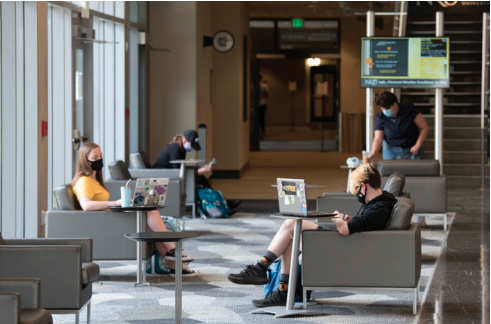
With all the changes taking place in our lives and on campus this
year, we wanted to hear from our students about their experiences
with switching to a world of virtual learning.
We asked our current majors and minors a few questions about their academic
experience over the past several months to get an idea of how they felt about this transition. We heard from students who had experienced taking online courses in the past, as well as from those who only had classes in a face-to-face setting before the COVID 19 pandemic.
Even though this transition has not exactly been smooth or easy, all agreed that switching to mostly online courses was the right thing to do to help keep everyone safe. It is hard to replace the experience that students gain through face-to-face instruction, although our professors are working hard to keep the same enthusiasm alive through virtual instruction. When asked what he missed about attending face to face classes, Spanish minor Kyle Moran said, “Being in a classroom, surrounded by other students and listening to a professor has always been my favorite part of learning. It is a social experience with the goal of intellectual growth. Growth of social skills, growth of explicit knowledge and growth of valuable tacit knowledge are readily accessible in the classroom setting. The characteristics of professors that encourage learning and fun are ever present in a classroom. Taking face-to-face courses offers me countless benefits that I truly miss.”
Spanish major Miriam Jenei says she misses “being able to ask questions in class and hearing the questions other students have that I may not have thought about.”
Most students agree that the online courses they are taking this semester offer a greater degree of flexibility than traditional face-to-face courses, but that flexibility doesn’t necessarily make up for the lack of social interaction that they’ve experienced compared to the language classes they have taken in the past.
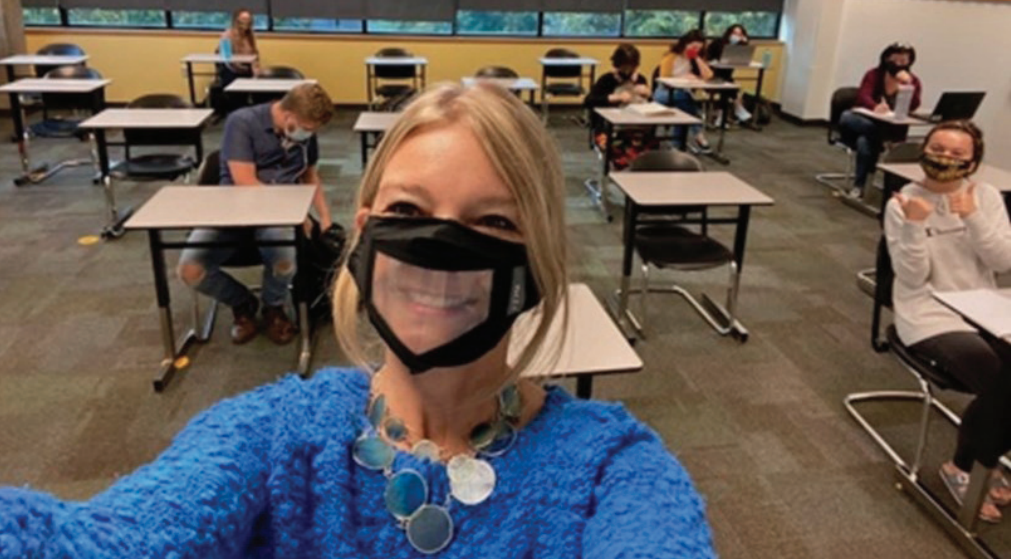
We also wanted to hear from our World Languages and Literatures faculty about how this transition has affected their ability to teach their classes.
While some professors have experience with teaching online courses in the past, this was an entirely new concept for some faculty who have always taught face-to-face. This transition to online course delivery has been challenging for both faculty and students. For German professor Dr. Andrea Fieler, it has been a very busy year—not only with the rapid transition to online teaching, but also because the German program has recently gone through some major changes and also adopted new books this semester. When asked how she felt about teaching online, Dr. Fieler responded, “I truly enjoy online teaching and try to bring the same enthusiasm as I would in a face-to-face classroom.” Despite all the challenges this year has presented, Dr. Fieler believes that most of her students have adapted well to these changes in her online and online synchronous German classes.
Like many other faculty, Spanish professor Dr. Hilary Landwehr felt that the rapid transition to online instruction in the spring was extremely challenging. She noted that her students also had a hard time adapting to the new delivery mode. In some cases, they did not have the tools they needed to participate in the virtual environment, like reliable internet connections or webcams. She also felt that students experienced a certain level of -“burnout”- with online learning and simply checked out.
She decided to teach her courses in the online synchronous delivery format in fall 2020 because of concerns for her own health and the health of her students, many of whom live locally and are thus in regular contact with their families, including at risk members. When asked how COVID-19 has impacted her course instruction, she gave the example of how she now does open book testing. She has not seen a major change in test averages, which she attributes to the fact that the online format makes it harder for students to grasp the material. However, she does not feel online teaching is the optimum course delivery mode from both from the professor’s and the students’ point of view. She observes, “[A]s the professor, there is a lot of information that I can take in automatically in the classroom that I consistently miss on Zoom. And even with the webcams, I’m not sure I’d recognize some of my students if I saw them on campus.” She definitely feels that the face-to-face format allows for more creativity and flexibility in her instruction.
Besides Dr. Landwehr, many WLL professors also opted for virtual or hybrid delivery formats in fall 2020. Professor Sandra Bazzani taught her SPI 101: Elementary Spanish I classes as online asynchronous but decided to teach her SPI 201: Intermediate Spanish I course in a hybrid format. Some days the class met fact-to-face (socially distanced and wearing masks) with some students participating via Zoom. Other days the entire class met on Zoom.
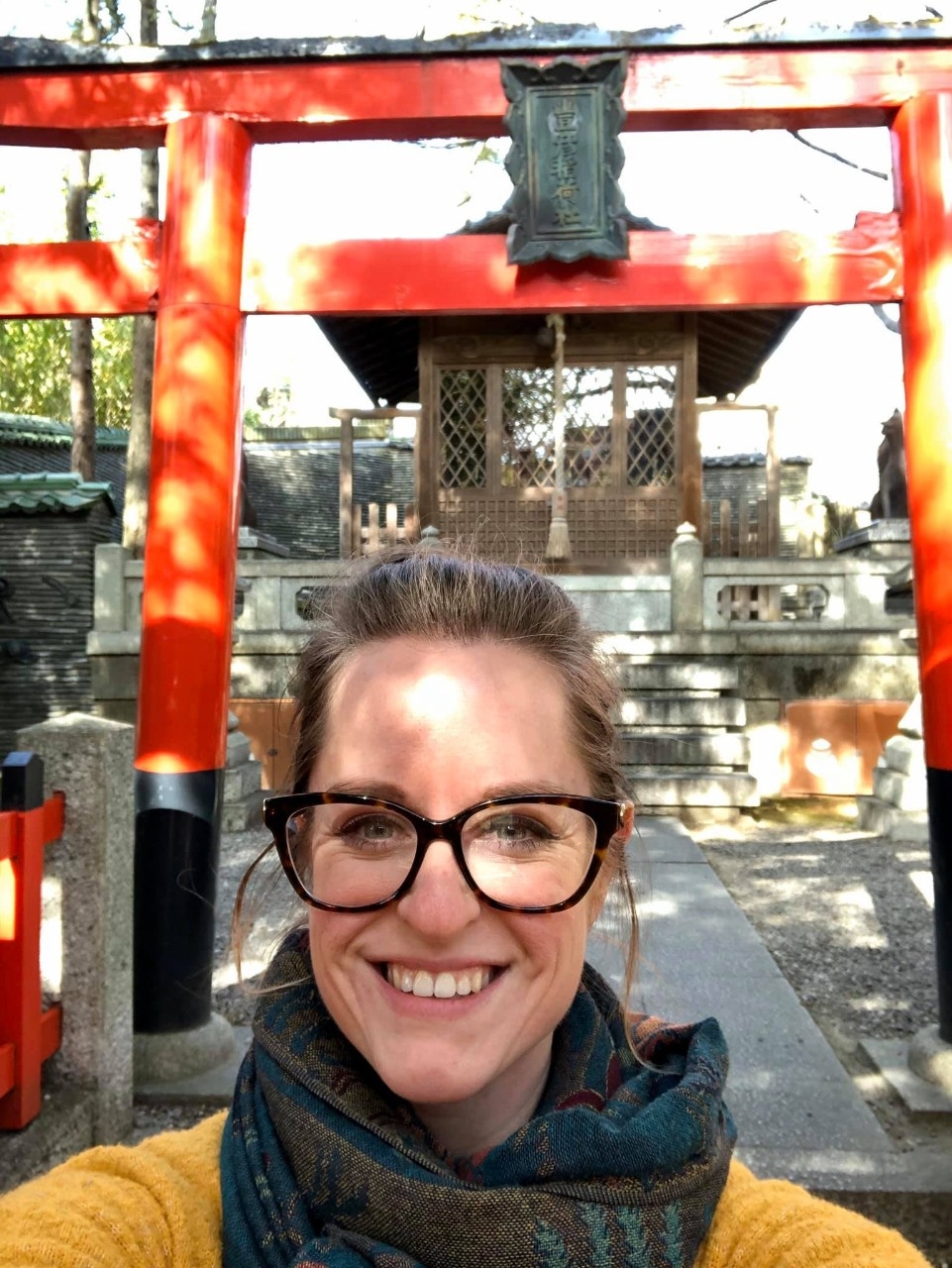
Many majors and minors in the World Languages and Literatures department have studied abroad to enrich their language learning experience. Immersing yourself in a new culture surrounded by your target language for any period of time has proven to be very beneficial to the language learning process. Unfortunately, most study abroad trips during 2020 were cut short or canceled, leaving many students disappointed in the fact that they could not benefit from the full experience. We reached out to students who studied abroad throughout this year to get their perspective on the effects COVID-19 had on their travel plans.
Japanese major Bethany Singleton studied at Nanzan University in Nagoya, Japan, in spring 2020. Because of the COVID-19 pandemic, she was only there for two months because Nanzan University made all students return home where they completed their courses online. While her time in Japan was cut short, she still was enriched and transformed by the experience. When asked about a particularly memorable experience that she had while studying abroad, she recalled the first time she went to Kosho-ji Temple in Nagoya. She had been walking around the neighborhoods of the city, exploring on her own when she found a beautiful cemetery that was connected to the temple. “The temple was breathtaking and inspiring, and I began going once a week at least to walk around the grounds, relax and take it all in” she said.
She said that she learned very quickly what certain gestures and body language meant, especially if it came from an older person versus a younger person. She also observed that language spoken by the majority of the individuals that she was around was also much more casual than she was accustomed to. “When we learn Japanese in the classrooms here at NKU, we are taught mostly the more polite or respectful forms of speech, however when I was there even some of my professors at Nanzan spoke more casually, so that was definitely an adjustment” she said.
This was Bethany’s second study abroad experience. She feels that these experiences have allowed her to reflect on who she is as an individual and what she wants out of her life. For her, there is something very intense and eye opening when one travels alone and is forced to make connections without anyone else to fall back on. She was the only student from NKU who attended Nanzan in spring semester. She explained that at while times that was very hard for her, it also allowed her to grow as her own person and force her out of her comfort zone. Because of this, she made amazing friends and had a very memorable experience in Japan.
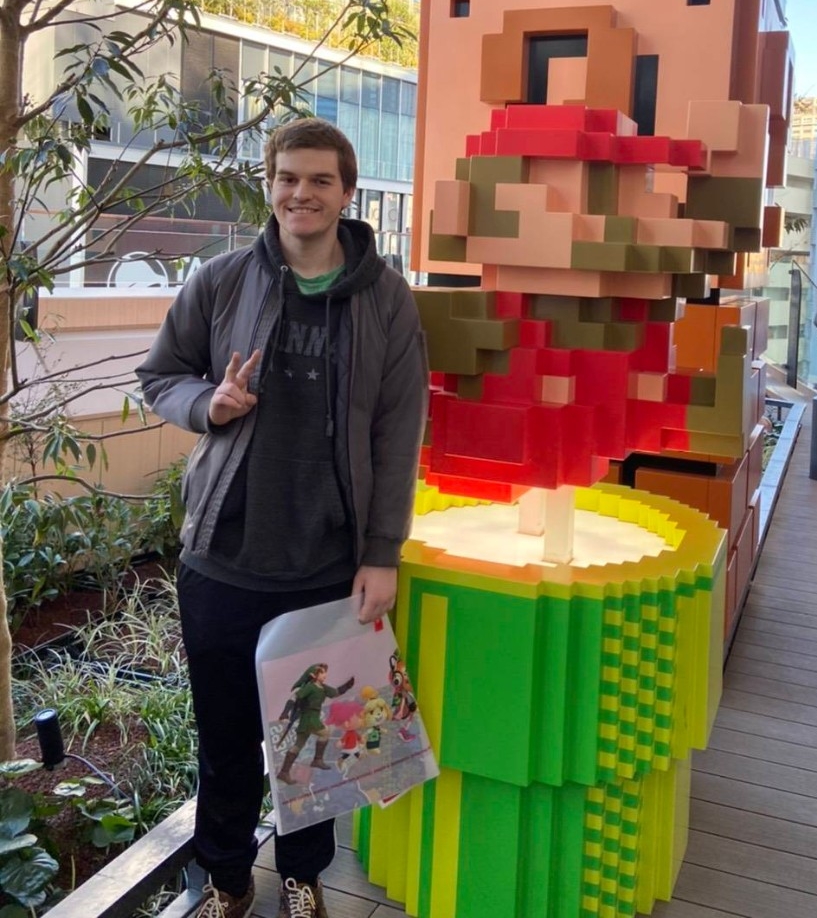
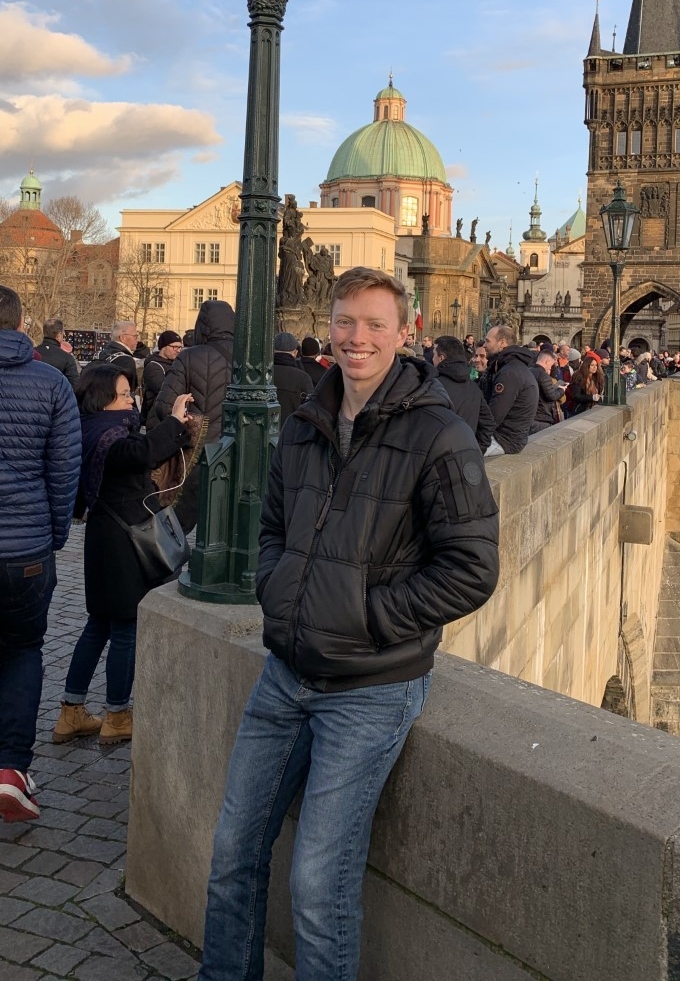

French minor Nahawa Sesay studied abroad in the city of Caen, in northern France’s Normandy region, over the summer of 2019.
Like Jack, Nahawa’s study abroad experience was not affected by the COVID-19 pandemic. One thing that Nahawa found particularly memorable was exploring around the area with her host mom. When asked how her study abroad experience transformed her as a person, Nahawa said, “It enabled me to see a side of me I never thought I had. I was able to go more out of my comfort zone than I had ever gone before. I challenged myself to a lot of tasks that I was able to achieve at the very end.”
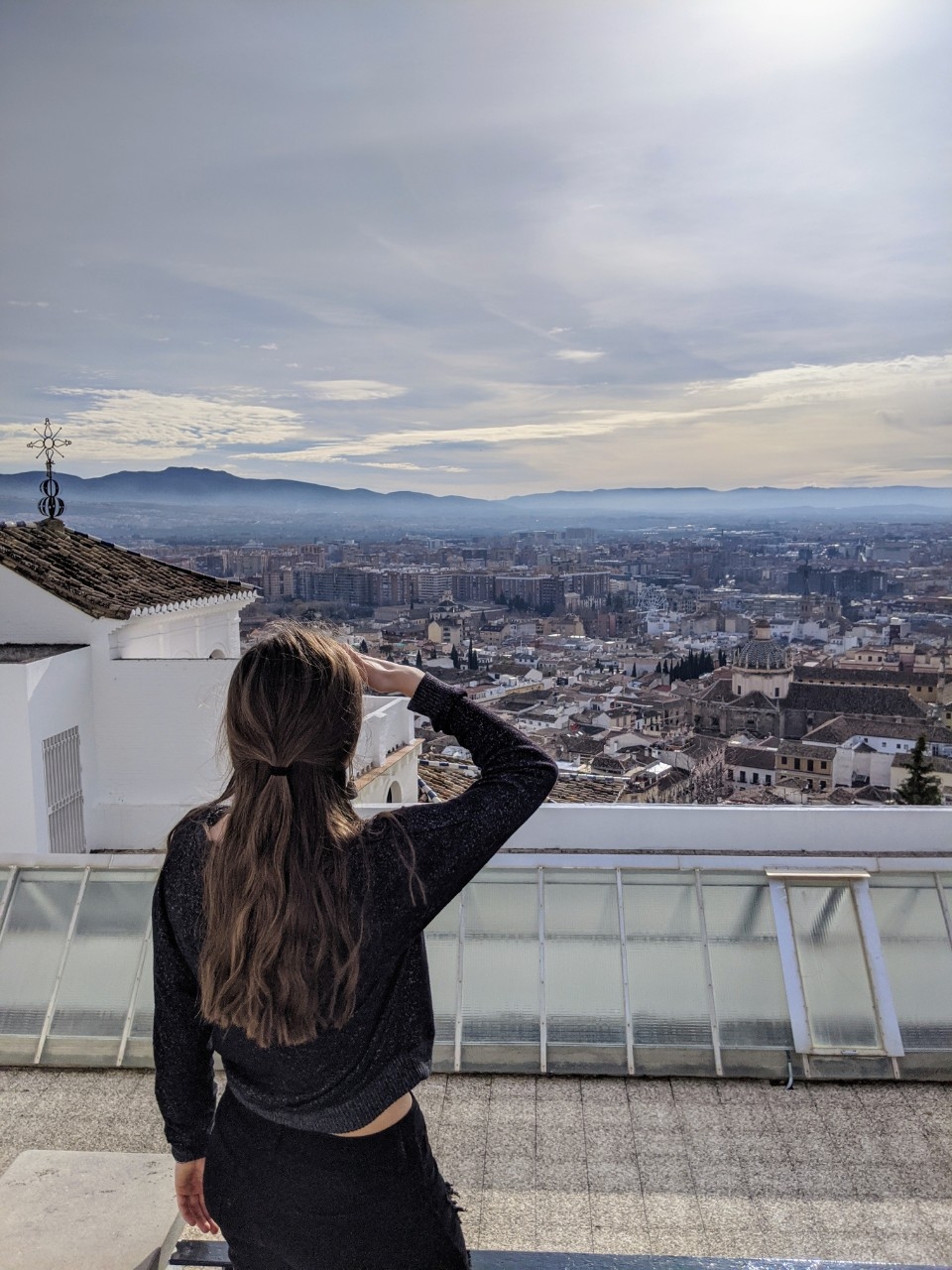
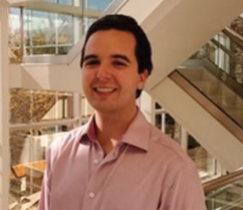
Nicholas Beatrice has continued his studies of German virtually at the Goethe-Institute in preparation for pursuing graduate studies in Germany in 2021. Nicholas is currently employed at Business Benefits Insurance Solutions and Active Day Disability Care.
Why did you choose to major or minor in a language?
I have always wanted to learn a foreign language and live in another country. I also love writing and learning about world politics. I strive to adopt perspectives of people from communities other than my own.
How do you apply your language skills and/or cultural knowledge in your professional and/or personal life?
The German language has massively altered my approach to writing in English. Studying German culture and politics has been eye opening for me. I enjoy comparing which customs the USA could inherit from Germany and vice versa to improve quality of life. I’m taking intensive German language courses at the Goethe-Institute until I am fluent enough to take a class at a German graduate school. My current plan is to study foreign affairs and return to the U.S. to influence American congress with my progressive political perspective. If these plans never come to fruition, there are virtually endless other career opportunities such as ambassador or translator/interpreter positions.
Why do you believe language study is important?
If you spend your whole life in one place, you might never realize that things can be done differently or more efficiently. Had I never studied another culture, I should assume that health care will always be incredibly expensive because “that’s how it’s always been.” Now that I’ve studied German, there are several things I want to incorporate into American culture, such as Germany’s keen attention to preserving the environment. Studying with NKU’s German department has introduced me to some of the finest personal relationships I’ve ever had in my life and I truly would not be the same person today had I not studied diligently at a fine university with such spectacular people.
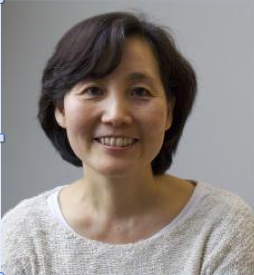
Although Dr. Agnew is a familiar face in the WLL department after teaching for us for several years, she was recently hired in the tenure-track position of assistant professor of Japanese in the Department of World Languages and Literatures earlier this year. We wanted to give everyone the chance to get to know a little about the life of Dr. Agnew.
Where are you originally from?
Tokyo, Japan.
Where did you earn your undergraduate and graduate degrees and what were your major(s) and minor(s)?
I earned my BA (Chinese Studies Major and Asian American Literature Minor) from Hunter College in New York City.
I earned my PhD from University of Washington. My major was Asian Languages and Literature and my dissertation was on Manchukuo Literature (The literature produced in Japan’s puppet state in China in the 30s).
How long have you been teaching, what and where?
I have been teaching Japanese language and literature for 20 years. I started teaching Japanese language as a teaching assistant in graduate school. I have also taught Chinese language at University of Dayton and NKU for a short period of time.
How long have you been teaching at NKU?
I taught at NKU as a part-time instructor for 10 years. This is my first year teaching as an assistant professor.
What do you like about working at NKU?
I like my students and colleagues at NKU. Since most students in my classes are very excited about learning Japanese it is always fun to teach them. They work hard to make my teaching meaningful. In exchange, I also want to work hard to make their college life meaningful and productive. My colleagues in the department are simply wonderful. There is no other word to describe them. They are intelligent, supportive and funny. There has never been a day that I didn’t feel like going to work in the morning, even in a cold winter morning. I know that many people don’t feel this way about their work. I am very lucky.
What are your research interests?
My current research interest is Murakami Haruki and his works. Murakami is probably the most popular Japanese writer in the world today. He has published 20 novels and his works have been translated into 50 different languages. I am writing a paper that examines how Manchukuo is depicted in Murakami’s works as well as how his works provide alternative narratives of WWII to Japan’s official narrative that often portrays Japan as the victim of the atomic bomb.
What is an interesting fact about yourself that people might not know?
I like DIY (Do It Yourself). We bought a 104-year-old house 10 years ago. The house needed a lot of restorations and remodeling so my husband and I, who had never worked around the house, did everything ourselves. We painted the exterior of the house. We also restored 12 old windows instead of replacing them with new windows (scraping the paint, sanding, painting and replacing the glass panes). One time when we were removing a window sash from a window frame, we found a piece of newspaper dated Jan. 13, 1931. We learned from the newspaper that back then window restoration cost 25 cents per window!
We thought it would be a fun idea to feature recipes from areas of the world represented by the languages we teach in our department. Our first recipe comes from Latin Professor Kathleen Quinn. Try this recipe at home, and let us know what you think!
Roast Pork (a la Apicius) Serves 8